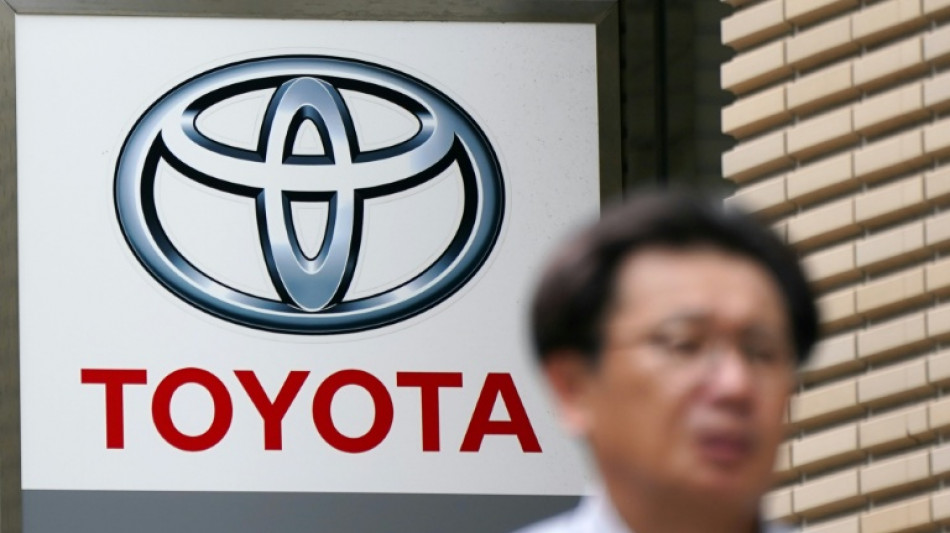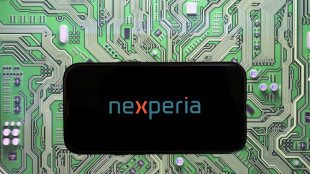
| RBGPF | 0% | 76 | $ | |
| CMSC | -0.02% | 23.775 | $ | |
| JRI | -0.36% | 13.7 | $ | |
| CMSD | 0.06% | 24.025 | $ | |
| SCS | -0.51% | 15.68 | $ | |
| RIO | -0.51% | 68.92 | $ | |
| NGG | 1.67% | 77.585 | $ | |
| BCC | 0.17% | 70.85 | $ | |
| GSK | -1.15% | 46.565 | $ | |
| RELX | -2.89% | 42.17 | $ | |
| RYCEF | -1.21% | 14.82 | $ | |
| BTI | 0.64% | 54.56 | $ | |
| BCE | -0.22% | 23.12 | $ | |
| VOD | 1.76% | 11.543 | $ | |
| AZN | 1.05% | 84.66 | $ | |
| BP | 1.13% | 36.231 | $ |

US tariffs prompt Toyota profit warning
US tariffs prompted Japanese auto giant Toyota on Thursday to cut its annual net profit forecast by 14 percent.
The world's largest automaker by vehicle sales now expects a net profit of 2.66 trillion yen ($18.06 billion), down from 3.1 trillion yen previously forecasted.
"Due to the impact of US tariffs and other factors, actual results showed decreased operating income, and the forecast has been revised downward," the firm said in a statement.
Its shares fell by as much as 2.4 percent in Tokyo afternoon trade before recovering off lows.
The Trump administration in April imposed a 25 percent levy on Japanese cars imported into the United States, dealing a hefty blow to Japan and its crucial auto sector.
Although Tokyo and Washington announced a trade deal in July, lowering that rate to 15 percent and providing a degree of relief for the industry, it's not yet clear when it will take effect.
There is also confusion over whether the car tariff -- as well as other "reciprocal" levies -- will be capped at 15 percent, or if these would come on top of those in place before Trump's trade blitz.
The auto industry had a pre-existing 2.5 percent tariff, meaning the levy currently stands at 27.5 percent.
Toyota's revenues in the first quarter were up 3.5 percent, but net income plunged by 36.9 percent.
- Tariffs hit forecasts -
The results come after Honda said Wednesday its net profit had halved in the first quarter because of US tariffs, although it upgraded its annual profit forecast due to the deal with Washington.
In the first three months of its fiscal year, which begins in April, net profit fell to 196.67 billion yen ($1.3 billion), a drop of 50.2 percent year-on-year, Honda said.
Revenue dipped 1.2 percent to 5.34 trillion yen.
Honda, Japan's second-biggest automaker after Toyota, has managed to withstand the pressure better than its Japanese competitors.
More than 60 percent of the vehicles it sells in the United States are built there, the highest percentage of all major Japanese automakers, according to Bloomberg Intelligence auto analyst Tatsuo Yoshida.
Struggling Japanese rival Nissan, whose mooted merger with Honda collapsed this year and which is slashing jobs and closing factories, in July posted a net loss of 116 billion yen ($784 million).
German carmaker BMW stuck to its 2025 targets last month despite quarterly profits tumbling a third due partly to US tariffs, insisting its large American operations meant it could weather the storm.
That stood in contrast to domestic rivals Volkswagen and Mercedes-Benz, who cut their outlooks as they grapple with the fallout from Trump's hardball trade policies.
Ford meanwhile projected a $2 billion full-year earnings hit due to the levies.
O.T.Hoermandinger--SbgTB



